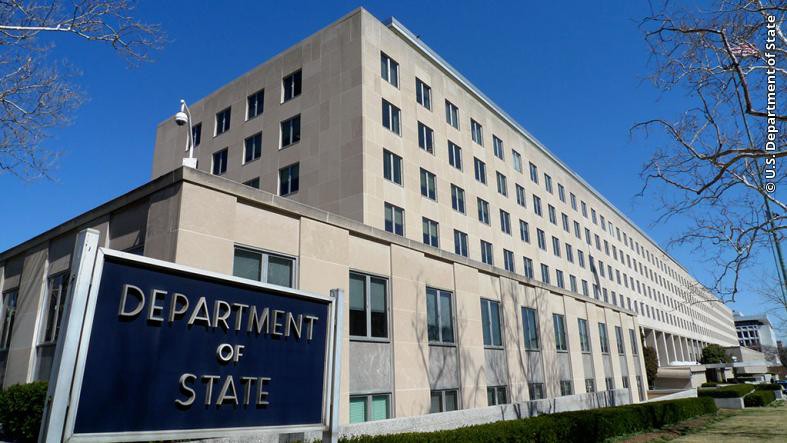31 August 2018 – The United Stated (US) Department of State says it has urged Bahrain to stop its attacks on civil society activists and political opposition leaders according to a communication issued earlier this month. Americans for Democracy & Human Rights in Bahrain (ADHRB) welcomes the State Department’s comments and urges it to publicly reiterate its position in a formal statement to the Government of Bahrain. Moreover, we urge the US Government to act on its concerns by pressuring Bahraini authorities to reform, including by suspending defense cooperation with abusive security agencies and imposing sanctions on top officials implicated in human rights violations.
In the communication, the State Department’s Bureau of Democracy, Human Rights, and Labor stressed that human rights are necessary for stability and security in Bahrain, calling for the urgent release of human rights defender Nabeel Rajab and Al-Wefaq opposition leader Sheikh Ali Salman, as well as the restoration of citizenship for prominent Shia Muslim cleric Sheikh Isa Qassim. The United Nations (UN) Working Group on Arbitrary Detention recently declared Rajab’s imprisonment for tweets and media interviews unlawful, prompting support from 127 international human rights organizations this week as the defender is set to spend his 54th birthday in prison over the weekend. Sheikh Salman faces further prison time and possibly the death penalty as Bahrain’s Public Prosecution Office prepares to appeal his acquittal on baseless espionage charges next Wednesday, 5 September 2018, while Sheikh Qassim is currently convalescing in London after an emergency medical procedure. The religious leader remains stateless and is expected to return to Bahrain.
“Advancing human rights in Bahrain and regional stability in the Gulf are mutually reinforcing interests, and we are committed to pursuing both,” said the State Department. “We believe societies are strengthened by expressions of opinion and dissent, and that opposition voices can play a vital role helping societies become more tolerant and inclusive. As a result we are deeply concerned about the Government of Bahrain’s actions over the past year against nonviolent political opposition and civil society. Specifically, we are concerned about restrictions on freedom of expression, assembly, and association, and the lack of progress on political reconciliation. We encourage Bahrain to clearly differentiate its response to peaceful political opposition from its response to violent militant groups, and we frequently discuss the importance of reconciliation and human rights at all levels of the government.”
The State Department specifically emphasized its efforts to address abuses against Rajab, Sheikh Qassim, and Sheikh Salman: “We have called for the government to restore citizenship to prominent cleric Sheikh Isa Qassim. Embassy officials regularly attend the trials of human rights activists and political figures whom we believe are being held arbitrarily, including activist Nabeel Rajab and leading opposition figure Sheikh Ali Salman, and we have urged the government publicly and privately to release these individuals. Department of State officials also meet regularly with the full spectrum of Bahraini civil society.”
While the State Department has not explicitly raised the case of imprisoned opposition figure Hassan Mushaima, the communication comes as the Bahraini government faces mounting international pressure over its mistreatment of Mushaima and other high-profile prisoners of conscience, including Rajab and Sheikh Salman. Mushaima’s health is deteriorating as a result of illegal government restrictions on medical care, prompting his son, Ali Mushaima, to launch a hunger strike outside the Bahraini embassy in London calling for urgent action to save his life. Ali Mushaima was himself hospitalized yesterday, 30 August 2018, after 30 days of the strike due to the government’s failure to meet his full set of requests.
Despite the State Department’s concerns, the US Government has steadily increased its unconditional support for the Bahraini authorities amid escalating abuses. The Trump Administration has stripped existing arms deals of reform restrictions and expanded overall weapons transfers while proposing further training programs for police units implicated in gross human rights violations. In May 2017, two days before Bahrain launched its deadliest raid on a peaceful protest in years, Trump met with Bahrain’s king and promised an end to any “strain” between the two countries. So far, the administration has also declined to take up applications for sanctions under the Global Magnistky Act against Bahraini officials that continue to commit gross human rights violations, and it is extending training programs for abusive Bahraini police units.
Husain Abdulla, ADHRB Executive Director, commented: “The Bahraini government is in the midst of an all-out assault on civil and political society ahead of the November parliamentary elections, and it is crucial for the State Department to be speaking out strongly against such spiraling repression. However, actions speak far louder than words, and these commendable statements are dwarfed by the Trump administration’s decision to double down on Bahrain’s most abusive security agencies with massive arms deals stripped of reform conditions. The State Department must absolutely continue to call for the release of human rights defenders like Nabeel Rajab – and it is absolutely correct that human rights reform is the only surefire path to stability – but the Bahraini authorities will never take this pressure seriously while they’re playing with brand new F-16s.”
ADHRB strongly supports the State Department’s call on Bahrain to end reprisals against political and civil society leaders like Sheikh Ali Salman, Sheikh Isa Qassim, and Nabeej Rajab. However, the US Government has implemented no concrete policy measures to achieve these stated goals. On the contrary, the administration has largely encouraged the Bahraini government to intensify its crackdown on opposition figures and human rights defenders. We therefore call on the State Department to integrate its human rights concerns into actionable policy on Bahrain in order to push for desperately needed reform ahead of the November elections. This policy platform must include sanctions and cuts to security assistance for units and officials perpetrating ongoing rights abuses in Bahrain in order to impel reform and rectify American complicity in the crisis.





